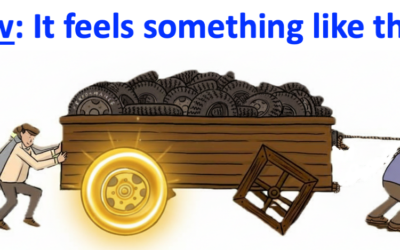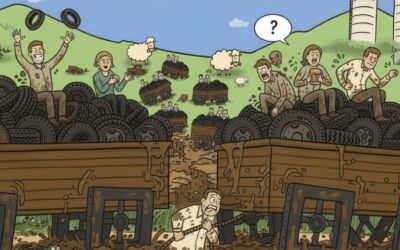Supervisors can a lot facilitation of communications and engagement and do a lot more in regards to motivation of their people, especially in these days or more and more remote working. Networking and Idea Sharing are keys to generating considered alternatives and there are a LOT of ideas about impacting people and performance when people start thinking together and sharing perspectives and support. My thought was to write about workplace applications of this idea.
A couple of good email conversations got me moving again on this issue of Supervisor as Facilitator and how little downside there seems to be to that concept of them being idea encouragers or coaches. This is really a main part of their jobs, yet one where we do not seem to be supporting them with skill training or with tools.
Who BUT the Supervisor can motivate the workers?
One of the email threads developed the idea that people hate training, which a bunch of us jumped on pretty hard in the conversation. There does not seem to be any data to support this idea that I could find, but it is true that a lot of training is wasted in training that has no visible impact or result. And a lot of people do not want to GO to training simply because there is no ROI for it in their view. Not a lot of training is something that people really want to just jump into, for a lot of reasons. “You are going to a training program” is often met with the comment, “Why? What did I do wrong?”
Some of the training is off-target and irrelevant or totally boring, done by people with good intentions but who are not SMEs (subject matter experts) or who do not have hands-on experience in the issues (it would be like me doing time management training or sales training or teaching people how to speak English!).
A lot of trainees either see little relevance of that training to their work or career or that the new things learned will not be supported in the workplace. Past experience can be tough to overcome. And the reality is that the work generally piles up when people are gone.
And sometimes training might cause people to feel like they are being appraised and tested, or that they will be potentially embarrassed when trying to put those new behaviors into real play in their workplace. I think the phrase might be “fear of constructive criticism” or some such thing.
And is it really a training need? Can they do it if you gave them $500 or put a gun to their head? So, are supervisors the trainers or simply the coaches and the people doing the followup to install the desired behaviors?
So, it should be obvious that supervisors should be trainers but also coaches and supporters, especially as training through LMS and smartphones becomes more and more the norm. Supervisors should be mentors and performance coaches, supporting the small changes in behavior that result in more small changes in behavior, something we call incremental improvement (or reality!).
Who BUT the Supervisor can really implement training?
Supervisors can also address The Fear Factor that so commonly affects workers and workplaces. My colleague Dan Stones has addressed that here, for example. Fear is the Mindkiller, and supervisors are absolutely the best people to address those issues and impact their workplaces. We need to do things differently!
But what about the fear within the supervisor for doing something differently? Who but their manager is going to support them as they try new things and do things differently? Human Resources? And who supports them if they make a mistake?
So who is going to do this serious human resource development (training, facilitation and engagement) in the workplaces and what outcomes do we expect? What tasks and commitments do we remove or eliminate to free up the time to do the coaching and mentoring? What current systems and processes are we going to have to disrupt to make new behaviors appear both on the shop floor and among the management team?
So, the question you need to ask is what needs to be done differently to really impact people and performance in your organization? Our management team generally has a good perspective in how organizational change is accomplished. For many based on what people report about their experiences, training and implementation looks something like this:

We can make the choices to really do things differently. But will we choose to do those things? What do you see supporting that decision and what do you see that blocks moving forward?
Here is a blog about overcoming resistance to new ideas.
PMC has some simple and highly effective tools that can support your improvement initiatives. Check out our Lost Dutchman’s Gold Mine team building simulation. Or download, The Fix.
But more than anything else, look at what needs to fundamentally change within your management team to allow people to make improvements and then start doing some things differently,
For the FUN of It!
 Dr. Scott Simmerman is a designer of team building games and organization improvement tools.
Dr. Scott Simmerman is a designer of team building games and organization improvement tools.
Managing Partner of Performance Management Company since 1984, he is an experienced presenter and consultant who is trying to retire!! He now lives in Cuenca, Ecuador.
You can reach Scott at scott@squarewheels.com
Learn more about Scott at his LinkedIn site.
Here is a link to a press release about The Search for The Lost Dutchman’s Gold Mine teambuilding exercise and its 30 years of positively impacting people and performance.
Pricing and terms are subject to change without notice.
Square Wheels® is a registered trademark of Performance Management Company
The Search for The Lost Dutchman’s Gold Mine is a trademark of Performance Management Company
Square Wheels images © Performance Management Company, 1993 – 2023. All rights reserved.







0 Comments